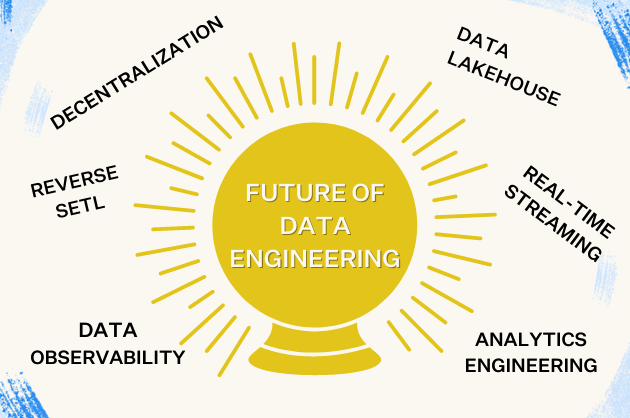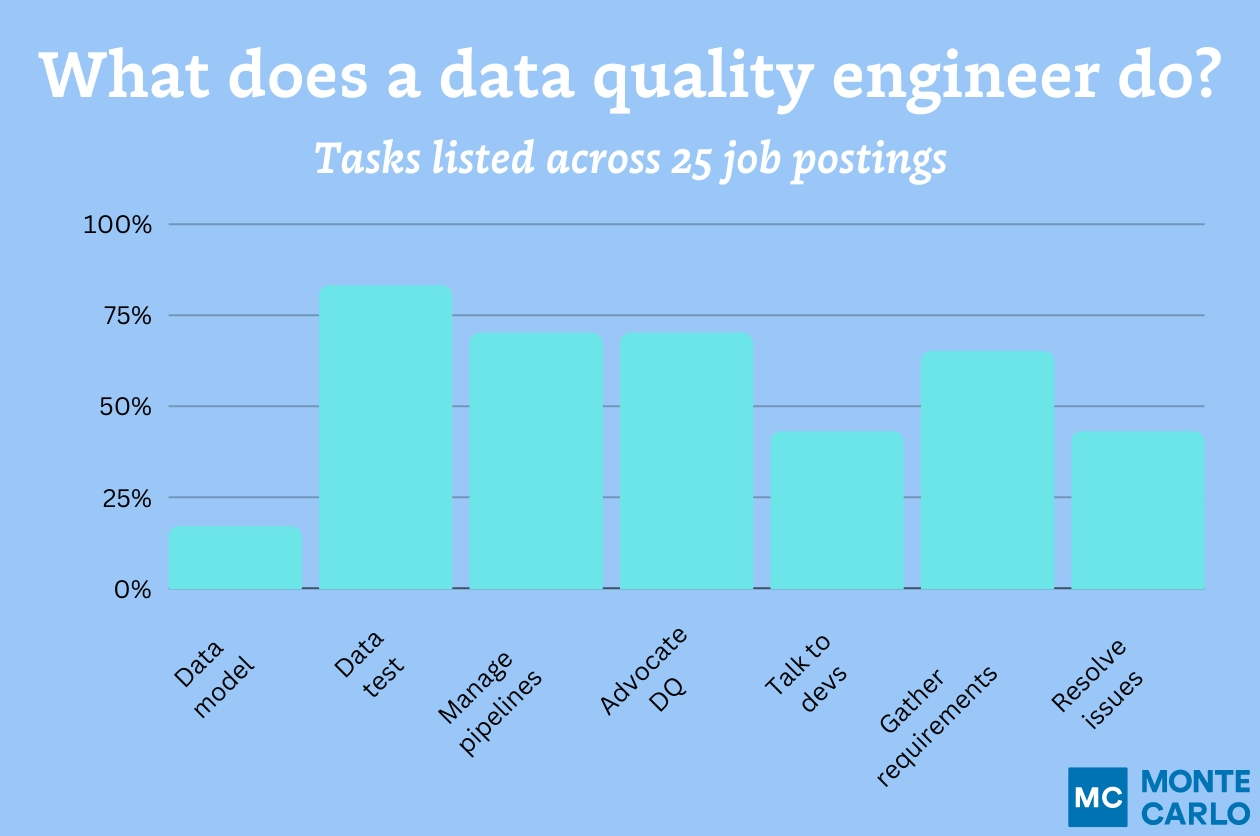What’s a Data Infrastructure Engineer? Skills, Role, Future & Salary

Every day, an uncountable amount of data flows through millions of businesses. Data Infrastructure Engineers are the professionals who ensure that this data flows smoothly and reliably. But what does a data infrastructure engineer do exactly?
Table of Contents
What is a Data Infrastructure Engineer?
A Data Infrastructure Engineer designs, implements, and maintains the systems that manage an organization’s data. Their work ensures that this data is always available, reliable, and of high quality, providing the backbone for data-driven decision-making within businesses.
To get a better understanding of their responsibilities, we analyzed 41 job postings on LinkedIn and found these key duties:
- Designing and Implementing Data Pipelines: The primary responsibility in 90% of the job postings is creating and managing data pipelines. This ensures that a company’s data flows seamlessly from various sources to storage systems and data warehouses, ready for analysis and business insights.
- Managing and Optimizing Databases: 85% of job postings emphasize the importance of database management. Engineers keep databases efficient and quick to retrieve data through regular maintenance, indexing, and optimizing queries for better performance. (Check out our Ultimate Guide To Data Quality for more on this topic.)
- Monitoring and Ensuring Data Quality and Performance: In 68% of job postings, engineers use data observability tools such as Monte Carlo to monitor the health and performance of data systems, ensuring data quality, detecting anomalies, and troubleshooting issues to keep data pipelines reliable. For a deep dive into these practices, see our guide on Data Observability For Dummies®.
Data Infrastructure Engineers also implement governance and quality frameworks to maintain data integrity and consistency. They set up redundancy and backup solutions to protect against data loss, ensuring data is always ready for business intelligence and analytics.
Difference Between a Data Infrastructure Engineer and a Data Science Engineer
With the names being so similar, you might naturally wonder how Data Infrastructure Engineers and Data Science Engineers differ.
Simply put, Data Infrastructure Engineers focus on building and maintaining data systems, while Data Science Engineers analyze this data to build predictive models. Both roles require strong programming skills and database knowledge, but their primary responsibilities differ.

For example, Data Infrastructure Engineers use their programming skills to lead system architecture and data engineering efforts. They design, implement, and optimize the systems that collect, store, and manage data. On the other hand, Data Science Engineers use their programming skills to perform advanced analytics, developing algorithms and models to extract insights from the data.
Skill Sets for Data Infrastructure Engineers
To excel in this role, Data Infrastructure Engineers need a diverse set of technical skills. Based on our job postings analysis, here are some key areas of expertise to focus on:
Technical Expertise

- Programming Languages: Proficiency in SQL (mentioned in 88% of job postings) and Python (78%) is essential. These languages are used to write efficient, maintainable code and create scripts for automation and data processing.
- Databases and Data Warehousing: Engineers need in-depth knowledge of SQL (88%) and NoSQL databases (71%), as well as data warehousing solutions like Hadoop (61%). They design scalable database schemas and optimize database performance, testing them often.
- Cloud Platforms: Understanding cloud services from providers like AWS (mentioned in 80% of job postings), Azure (66%), and Google Cloud (56%) is crucial. Managing cloud-based data services, cost optimization, and scaling are key responsibilities, and these trends are likely to grow along with the future of data governance.
- Data Pipeline Tools: Familiarity with tools such as Apache Kafka (mentioned in 71% of job postings) and Apache Spark (66%) is vital. Engineers design and maintain data ingestion and processing pipelines, handling both real-time data streaming and batch processing. Engineers should make sure to monitor these pipelines as well.
Day-to-Day Operations
- System Monitoring and Troubleshooting: Regular monitoring of system health performance using a data observability platform is a daily task. This includes troubleshooting, updating, and patching data systems to maintain their efficiency, as highlighted in 85% of job postings.
- Uptime and Performance: Ensuring high system uptime and performance involves implementing monitoring and alerting systems, mentioned in 80% of job postings. Engineers must identify and resolve potential issues proactively.
- Emergency Handling: Responding to system outages and data breaches is a critical part of the role, cited in 44% of job postings. Engineers perform root cause analysis and implement fixes to prevent recurrence.
Collaboration with Cross-Functional Teams
- Interdisciplinary Work: Data Infrastructure Engineers work closely with data scientists, analysts, and software engineers, as indicated in 83% of job postings. They understand data requirements, provide necessary support, and ensure data accessibility and quality for analytics and machine learning.
- Collaborative Projects: Examples of collaborative efforts include developing new data features and APIs, and enhancing data security and compliance measures, highlighted in 78% of job postings.
In summary, Data Infrastructure Engineers must blend technical prowess with practical problem-solving skills, while working collaboratively to support the data needs of their organizations.
Data Infrastructure Engineer Career Path
Starting a career as a Data Infrastructure Engineer usually begins with a degree in Computer Science, Information Technology, or a related field, which was listed in practically all of the job postings.

While still in school, gaining hands-on experience through internships is invaluable. After graduation, you can transition into a junior data engineer or a systems administrator role. There you can build your skills in SQL, Python, data modeling, and basic networking.
As you continue learning new open-source tools, also consider contributing to their codebase and writing technical blogs about your findings. This will build practical experience and a professional online presence.
Maybe you also have a data project you have been meaning to build at home, like for monitoring energy consumption or air quality? Use a modern data stack to get professional experience in your free time.
From there, you should be ready to become a Data Infrastructure Engineer!
And once there, you will be rewarded with some great salaries.
Using information collected from official H1B market-rate salaries, data infrastructure engineers have a median base salary of $175,000 across America.

This was supported by the salary ranges listed in the job postings we analyzed as well. Even if the job postings did not include a salary range, the large companies that we found hiring for this position, such as JPMorgan Chase, Amazon Web Services, Boston Consulting Group, and Cloudflare are also known to pay higher engineering salaries.
The Future of Data Infrastructure Engineering
The future of Data Infrastructure Engineering is bright, shaped by the continued growth of big data technologies and analysis.
Machine learning and AI are also increasingly incorporated for predictive maintenance and optimization, using models for data quality and anomaly detection. This, along with advancements in data storage and processing technologies will constantly demand new skills from Data Infrastructure Engineers.
For more insights, read Monte Carlo’s blog on The Future of the Data Engineer.
Preparing for a Career in Data Infrastructure Engineering
To prepare for a career in Data Infrastructure Engineering, the quickest way to level-up would be getting an industry-recognized certification for the technologies you hope to work with, such as:
- AWS Certified Data Engineer – Associate for focusing on AWS cloud products, which were the most popular in the job postings we analyzed.
- Microsoft Certified: Azure Data Engineer Associate for fans of Azure’s data infrastructure.
- Google Professional Data Engineer for users of Google’s cloud products.
Continuous education through workshops, conferences, and self-study is essential for making your dreams of becoming a Data Infrastructure Engineer a reality. Company blogs can also provide a lot of information about what real engineers are currently using in the field, such as Monte Carlo’s Modern Data Leader’s Playbook or the Survey: The State Of Data Products.
Stay curious and keep learning every day. Best of luck on your career journey!
Our promise: we will show you the product.
Frequently Asked Questions
What does a data infrastructure engineer do?
A data infrastructure engineer designs, implements, and maintains the systems that manage an organization’s data, ensuring it is always available, reliable, and of high quality. They create and manage data pipelines, optimize databases, and use data observability tools to monitor system health and performance, ensuring data integrity and consistency.
What are the duties of infrastructure engineer?
The duties include designing and implementing data pipelines, managing and optimizing databases, monitoring and ensuring data quality and performance, implementing governance and quality frameworks, setting up redundancy and backup solutions, troubleshooting system issues, and collaborating with cross-functional teams to support data needs for analytics and machine learning.
How much do infrastructure engineers make in the U.S.?
Infrastructure engineers have a median base salary of $175,000 in the US.
What is the career path for infrastructure engineer?
The career path typically starts with a degree in Computer Science, Information Technology, or a related field, followed by gaining hands-on experience through internships. After graduation, one can start as a junior data engineer or systems administrator, progressing to a data infrastructure engineer role. Continuous learning and obtaining industry-recognized certifications can further advance their career.
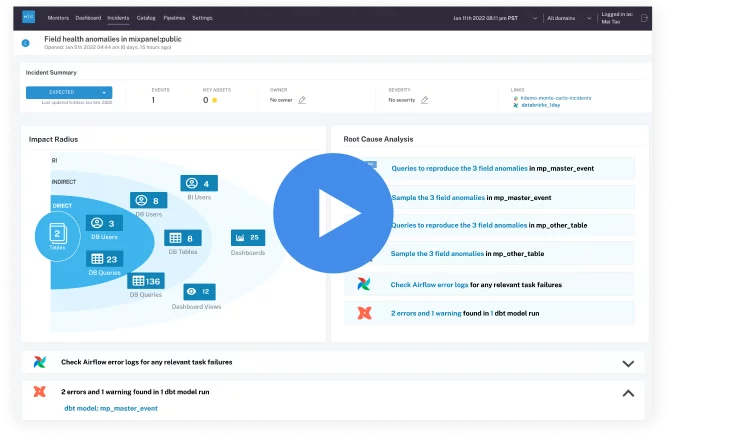 Product demo.
Product demo. 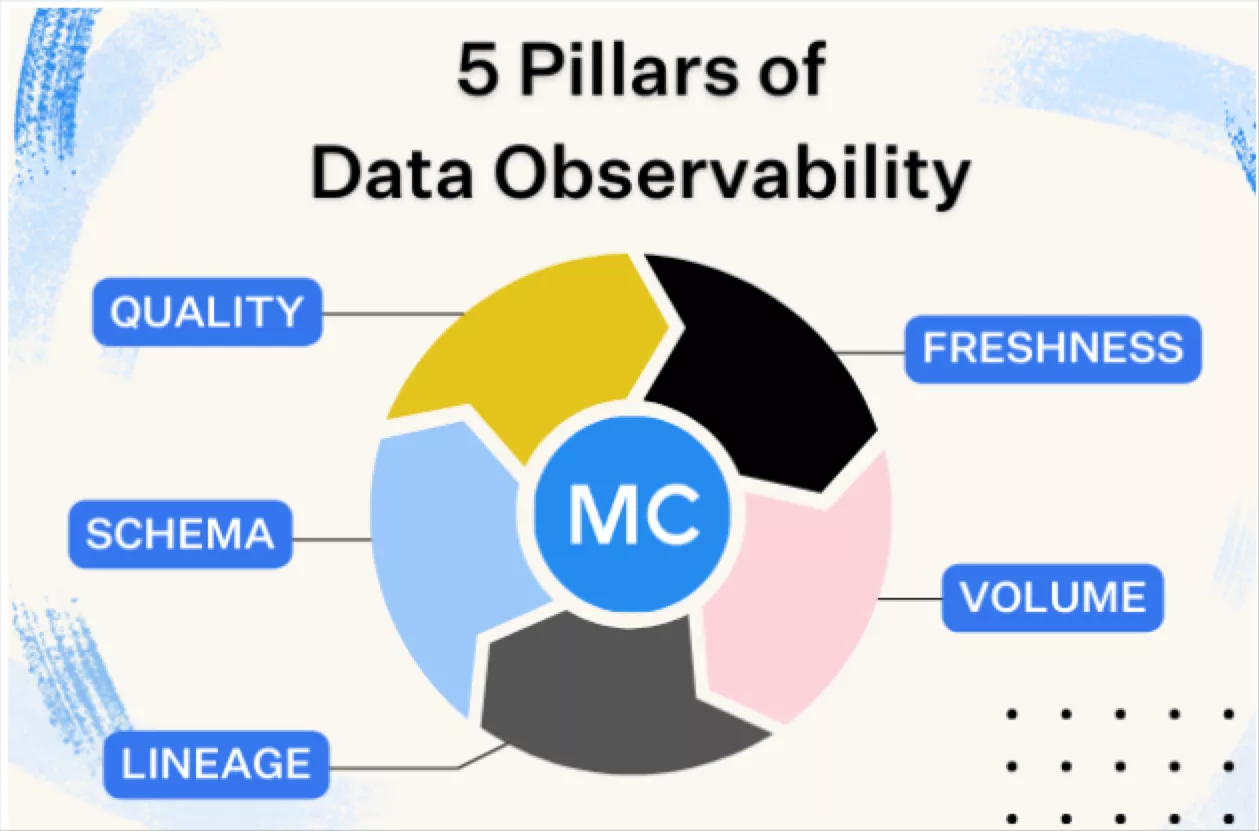 What is data observability?
What is data observability? 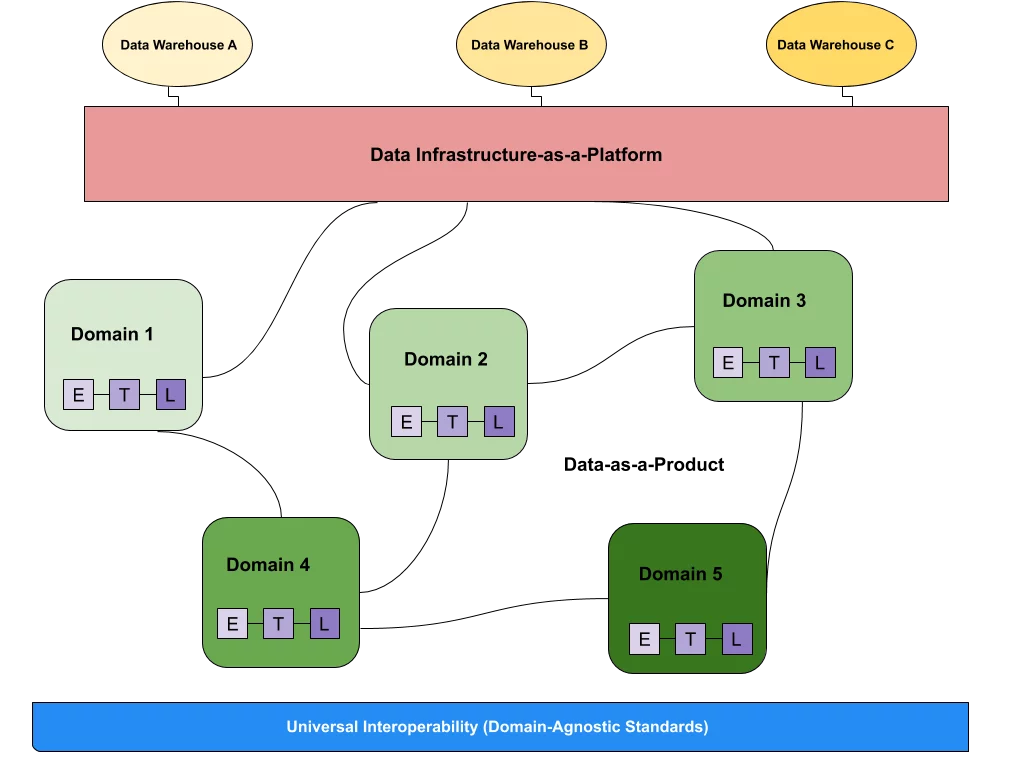 What is a data mesh--and how not to mesh it up
What is a data mesh--and how not to mesh it up 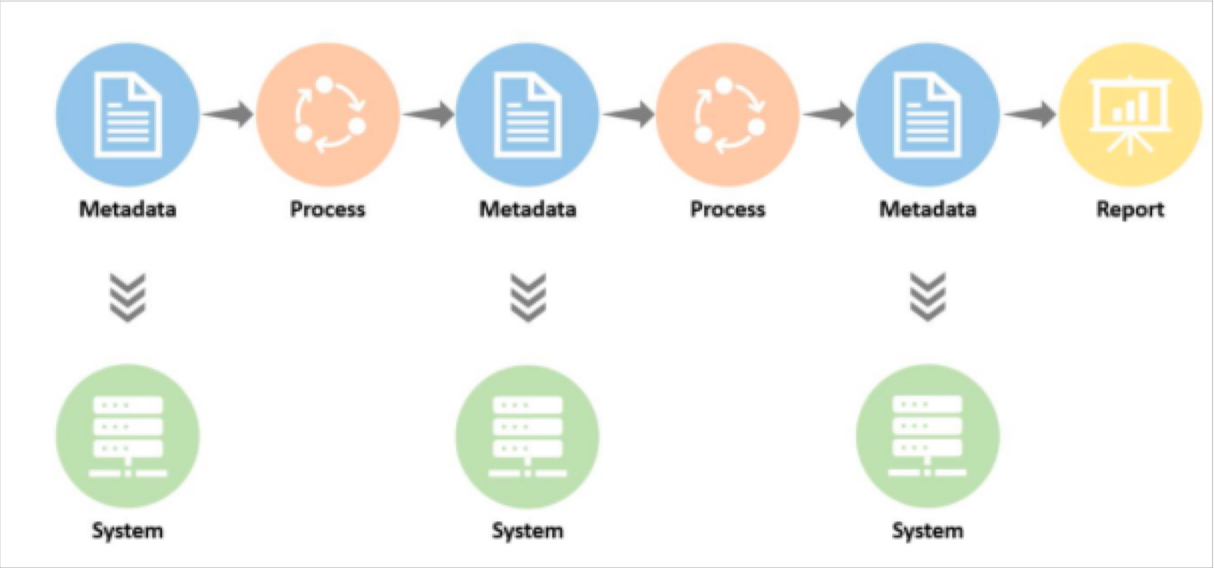 The ULTIMATE Guide To Data Lineage
The ULTIMATE Guide To Data Lineage 

